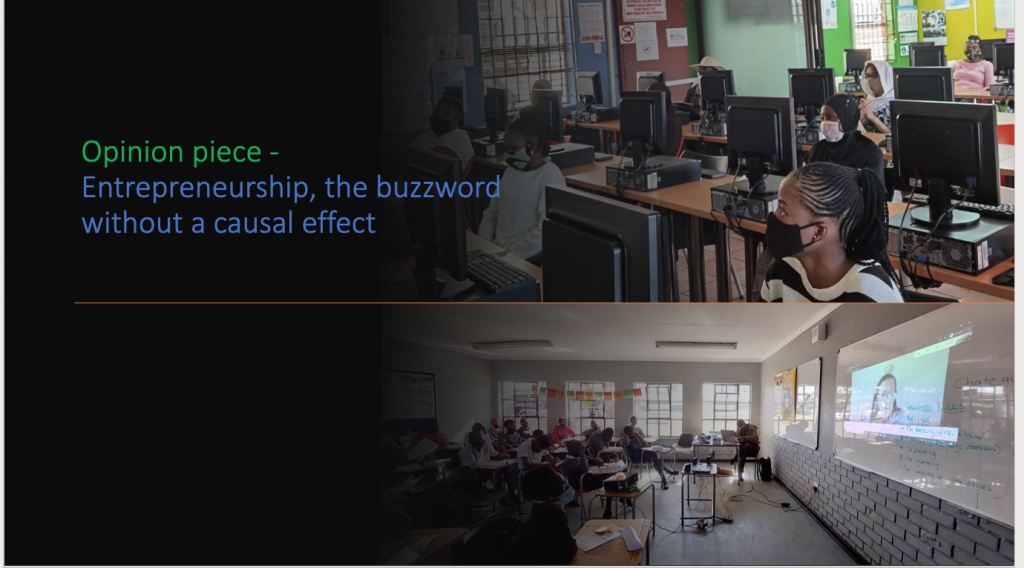JA SOUTH AFRICA – YOUTH DAY OPINION PIECE
Entrepreneurship can be defined as the discovery and exploitation of opportunities. One identifies a need and comes up with a solution to remedy the problem, on a great scale whilst making a profit. Easy to define but not so easy to execute. So much so, that registering a business in the South African economy takes just a few clicks. The 2018- 2019 CIPC Annual report announced 395 320 businesses were created for the period under review. Whilst one can boast of the high number of registered businesses, the number of these that remain operational in the first year is no more than 15 %. Whilst the gospel to save South Africa is entrepreneurship, education has seemingly lagged behind, yet is still one of the key requirements in moving our economy forward. Education coupled with experience and the skills for the work environment should be the buzzwords that will have the desired outcome.
Whilst the youth of the preceding generation called for access to education, our current youth are left to pick up the baton and add the other requirements needed to move their generation forward.
According to South Africa’s National Youth Commission Act, youth is defined as individuals between the ages of 14-35. The current generation cohort that falls within the 14-35 youth range is divided into Generation Z (Gen Z’s) and millennials. Whilst these groups share some similarities, the difference is as follows: Millennials are a generation that are very familiar with the use of the internet, mobile devices, and social media having accessed it when entering the workforce. Gen Z’s on the other hand is the first generation to have grown with access to the internet and portable digital technology at home. Termed Gen Z colloquially as Zoomers.
This is our current “youth” cohort and whilst they have better access to education, the quality and level of education still defines their access to opportunities.
According to Stats SA, 2021 April release 46% of youth are unemployed. In the first quarter of 2020, youth accounted for 63 % of the total number of unemployed persons. Added to the strain of unemployment, graduates accounted for 33, 1 percent. Thirty-three percent is a significant number, but this number is still lower than those with “other” non-graduate education levels who are unemployed. Thus, highlighting that education remains a key driver in accessing better opportunities. Access to work opportunities still presents a very unfortunate dichotomy, employers hire people with experience, meaning inexperienced youth who do not possess formal education and are unemployed remain at the bottom of the food chain in as far as accessing the economy. Whilst the graduates have a far better chance of being employed, the world of work is changing and requires youth to be equipped with the correct skills relevant for the workplace. Added to the mix is the need for youth to create employment for themselves, with the glamorization of “entrepreneurship” and being one’s own boss, in an effort to shift the economy to one that can absorb the labor force. But skills like entrepreneurship are taught and the need to suddenly be entrepreneurial is an unfair goal as not all possess an inherent lineage of entrepreneurship.
Ideally one would need to possess a degree, have experience, possess work readiness skills, and also be entrepreneurial whilst still be technologically savvy. A bridge is needed.
The government needs to stop glamourizing entrepreneurship as an option should finding a job be unsuccessful and rather teach it at the grassroots level. If entrepreneurship is not learned at home, then it can be taught in school. To take it a step further, a policy needs to be introduced for individuals who have tested their hand at entrepreneurship for at least three years to get credits on the National Qualification Framework, as a learning experience and should be recognized for people who find themselves back in the job market and added as work experience. Perhaps that will instill seriousness in this very daunting venture as opposed to simply seeing it as a quick fix. The success of a democracy is far from over if education levels still define who accesses economic opportunities. Organisations like JA South Africa, which provide work readiness, entrepreneurship skills training, and financial literacy are green shoots of a move towards entrepreneurship being a buzzword to providing the causal effect needed where individuals gain the right skills needed by millennials and Gen Z youth.






